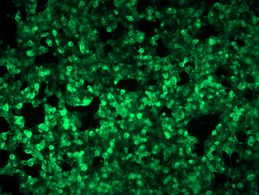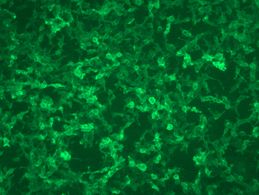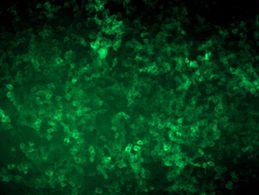Breast Cancer Research Tools
At OriGene, we understand the complexity of breast cancer research. That's why we've curated a comprehensive suite of cutting-edge tools meticulously designed to empower researchers, clinicians, and scientists in their pursuit of deeper insights, effective therapies, and breakthrough discoveries. We offer the following research tools:
- cDNA Clones: For over-expression studies, functional analysis, & protein production. View More.
- Clone Sets: For high-throughput screening and pathway studies. View More.
- Antibodies: For immunohistochemistry, western blotting, and immunofluorescence assays. View More.
- Recombinant Proteins: For studying protein-protein interactions studies, biochemical assays, and biomarker identification. View More.
- MicroRNA: For investigating miRNA involvement in breast cancer progression, metastasis, and as potential therapeutic targets. View More.
- siRNA Oligo Duplexes: For transient gene knockdown studies. View More.
- shRNA Plasmid Kits: For long-term gene silencing studies, loss-of-function experiments, and creating stable cell lines for research. View More.
- Transduction-Ready Viral Particles: Lenti & AAV available for delivering genetic material to cells that are hard to transfect (i.e. Stem Cells). View More.
- CRISPR Knockout Kits: For precise gene knockout studies, loss-of-function studies, and creating stable cell lines for research. View More.
- Tissues: For histological analysis, protein analysis, and drug screening studies. View More.
Popular Breast Cancer Gene Targets
ALDH1 AR ATM BARD1 BRCA1 BRCA2 BRIP1 Cadherin CASP8 Caveolin CD44 CDH1 CHEK2 Claudin CTLA4 CYP19A1 Cytokeratin EGFR ESR1 FGFR2 GRB7 H19 HER2 LSP1 MAP3K1 MRE11A MUC1 NBN P53 PALB2 PGR PTEN RAD51 RAD51C RAD51DcDNA Clones for Breast Cancer Research
Directions: Enter your gene name and select one item from each dropdown option, then press submit to view the plasmids we offer for your research.

Featured Brand – TrueORF® Gold Plasmids
OriGene’s TrueORF® Gold plasmids are an invaluable resource in genetic research. With a selection of over 18,000 meticulously curated plasmids tailored for human genes, these clones epitomize reliability and accuracy. Each clone undergoes stringent validation processes, including expression validation and sequence verification, ensuring their fidelity and functionality. These clones are also available with next-day shipping, allowing researchers to save time and start their experiments as soon as possible!
Furthermore, OriGene's comprehensive catalog of clones have earned the trust of researchers worldwide, gathering over 10,000 citations. View citations.

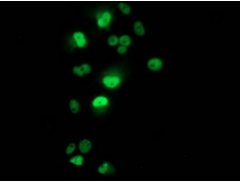
Anti-TP53 mouse monoclonal antibody ([TA502870]) immunofluorescent staining of COS7 cells transiently transfected by our TrueORF Gold TP53 plasmid ([RC200003]).
Clone Sets for Breast Cancer Research
OriGene offers a diverse array of clone sets comprising of sequence-verified and expression-ready clones. Researchers studying the complexities of breast cancer can utilize these clone sets to study gene pathways involved in tumorigenesis and disease progression. Pre-assembled clone sets and custom options are available.
Pre-Assembled Clone Sets
| Gene Families | SKU | Description | Layout |
|---|---|---|---|
| Transcription Factors | TCTF101 | Human transcription factors clone set I, containing 90 cDNA clones in mammalian expression vector | |
| TCTF102 | Human transcription factors clone set II, containing 90 cDNA clones in mammalian expression vector | ||
| Protein Kinases | TCPK101 | Human protein kinases clone set I, containing 90 cDNA clones in mammalian expression vector | |
| TCPK102 | Human protein kinases clone set II, containing 90 cDNA clones in mammalian expression vector | ||
| GPCR | TCGR101 | Human GPCR clone set I, containing 90 cDNA clones in mammalian expression vector | |
| TCGR102 | Human GPCR clone set II, containing 90 cDNA clones in mammalian expression vector | ||
| Secreted | TCSP101 | Human secreted gene clone set I, containing 90 cDNA clones in mammalian expression vector | |
| TCSP102 | Human secreted gene clone set II, containing 90 cDNA clones in mammalian expression vector | ||
| Transmembrane | TCTM101 | Human transmembrane clone set I, containing 90 cDNA clones in mammalian expression vector | |
| TCTM102 | Human transmembrane clone set II, containing 90 cDNA clones in mammalian expression vector |
Create Your Own Clone Sets by Selecting from a Pre-selected Pathway List
 |
 Request a quote! |
| Gene Families | TrueORF (Myc-DDK Tagged) | TrueClone (Untagged) |
|---|---|---|
| Breast Cancer | View List | View List |
| Breast Cancer & Estrogen Receptor Signaling | View List | View List |
| MAP Kinase Signaling Pathways | View List | View List |
| MAPK Cascade | View List | View List |
| MAPK signaling pathway KEGG | View List | View List |
| p38 MAPK signaling pathway | View List | View List |
| P53 | View List | View List |
| p53 Signaling Pathway | View List | View List |
| Regulation of Actin Cytoskeleton KEGG | View List | View List |
| Tumor Metastasis | View List | View List |
View more pathway lists here.
Antibodies for Breast Cancer Research
Our antibody portfolio ensures specificity and reliability in diverse applications, from immunohistochemistry to immunofluorescence, western blots and more. Explore our catalog to discover essential tools for your breast cancer research journey.
Directions: Enter your gene name and select one item from each dropdown option, then press submit to view the antibodies we offer for your research.
Featured Brand – UltraMAB® Antibodies
UltraMAB® antibodies ensure unparalleled specificity and accuracy. These ultra-specific antibodies are validated against over 17,000 human antigens using a high-density protein microarray, ensuring that there is limited cross reactivity. View details of High-Density Protein Microarray.
OriGene's antibodies have made a significant impact in scientific research, reflected by their extensive citation in academic literature. With over 9,000 citations, OriGene's antibodies have become a cornerstone in diverse fields of study, including but not limited to oncology, immunology, neuroscience, and developmental biology. View citations.

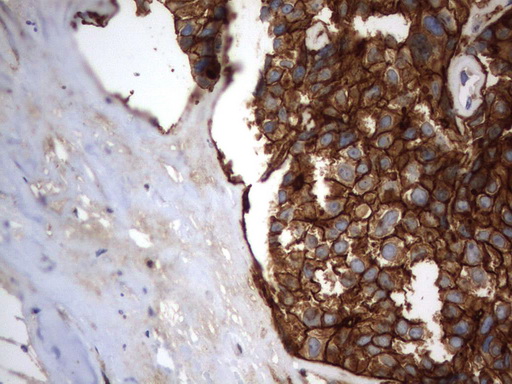
Immunohistochemical staining of paraffin-embedded Adenocarcinoma of Human breast tissue using anti-CD44 mouse monoclonal antibody. ([UM500099]; heat-induced epitope retrieval by 10mM citric buffer, pH6.0, 120°C for 3min) (1:500).
Protein Biomarkers for Breast Cancer Research
Powered by our TrueORF® human cDNA clones, OriGene offers full-length human proteins expressed in HEK293 cells and other systems. These proteins serve as indispensable positive controls in ELISA and antibody assays focused on breast cancer markers, ensuring the reliability and precision of experimental outcomes in studying this complex disease. Furthermore, OriGene's recombinant proteins facilitate investigations into protein-protein interactions specific to breast cancer-related pathways, shedding light on critical mechanisms driving the disease.
Directions: Enter your gene name and select one item from each dropdown option, then press submit to view the proteins we offer for your research.
Featured Brand – MVPro® Proteins
MVPro® proteins are full-length, recombinant human proteins expressed in HEK293T cells. Their properties are very close to native proteins, making them idea for antibody development, immuno-assays, & structure-function studies.
OriGene recombinant proteins have been mentioned in over 1,400 citations, a testament to their reliability and widespread recognition within the scientific community. This wealth of citations underscores the pivotal role our proteins play in advancing scientific exploration and innovation. View citations.
 |  |
Coomassie blue staining of purified ESR1 protein (Cat# [TP313277]). The protein was produced from HEK293T cells transfected with ESR1 cDNA clone (Cat# [RC213277]) using MegaTran 2.0 (Cat# [TT210002]).
MicroRNA in Breast Cancer [1]
microRNAs are small non-coding RNA molecules that play a significant role in regulation of gene expression via RNA silencing and post-transcriptional regulation pathways. In breast cancer, differential expression of miRNA plays a critical role in regulating the invasion process by influencing cytoskeletal structure, cell-cell adhesion junctions, cancer cell-ECM interaction, tumor microenvironment, EMT transition and cancer stem cell abilities. Understanding miRNA's role in breast cancer will enable a better management of breast cancer metastasis.
Human miRNAs in breast cancer:
Up regulated:
hsa-miR-21 hsa-miR-29b hsa-miR-155Down regulated:
hsa-miR-10b hsa-miR-125 hsa-miR-14Refer to the table below for a list of all microRNAs involved in breast cancer
| Name of miRNA | miRNA expression pattern | Target Genes affected by miRNA | miRNA Role in Invasion-Metastasis Cascade |
|---|---|---|---|
| miR-142-3p | UP | ITGAV, WASL, RAC1, CFL2 | Cancer cell invasiveness inhibition |
| miR-495 | UP | JAM-A | Cancer cell migration |
| miR-10b | UP | HOXD10 | Cell migration and invasion |
| miR-373 | UP | ITGA2 | Cell migration, metastasis |
| miR-103/107 | UP | DICER1 | EMT, cell migration, metastasis |
| miR-661 | UP | NECTIN1, STARD10 | EMT, invasion |
| miR-221/222 | UP | TRPS1 | EMT, invasion and migration (basal-like BC) |
| miR-23a | UP | CDH1 | EMT, metastasis |
| miR-374a | UP | WIF1, PTEN, WNT5A | EMT, metastasis |
| miR-22 | UP | TET1-3 | EMT, stemness |
| miR-155 | UP | RHOA | EMT, tight junction dissolution, migration and invasion |
| miR-191/425 | UP | DICER1 | Invasion and metastasis |
| miR-221 | UP | CDH1 | Invasion and metastasis |
| miR-221 | UP | DNMT3B | Pluripotency and stemness |
| miR-21 | UP | TPM1 | Tumor growth and malignant phenotype |
| miR-145 | DOWN | JAM-A | Cancer cell motility inhibition |
| miR-145 | DOWN | JAM-A | Cancer cell motility inhibition |
| miR-198 | DOWN | CDCP1 | Cell adhesion and migration inhibition |
| miR-154 | DOWN | ADAM9 | Cell migration and invasion inhibition |
| miR-200a | DOWN | CX43 | Cell migration and metastasis inhibition |
| miR-206 | DOWN | CX43 | Cell migration and metastasis inhibition |
| miR-181a-5p | DOWN | MMP14 | Cell migration inhibition |
| miR-539 | DOWN | LAMA4 | Cell migration inhibition (TNBC) |
| miR-7 | DOWN | PAK1 | Cell motility and invasiveness inhibition |
| miR-494 | DOWN | PAK1 | Clonogenic ability and cell migration, invasion and metastasis inhibition |
| miR-29b | DOWN | VEGFA, ANGPTL4, PDGF, LOX, MMP9 | EMC re-modeling and metastasis inhibition |
| miR-200c | DOWN | ZEB1, TKS5, MYLK | EMT and invadopodia forming inhibition |
| miR-153 | DOWN | MTDH | EMT and invasion inhibition |
| miR-124 | DOWN | SNAI2 | EMT and metastasis inhibition |
| miR-200b | DOWN | FERMT2 | EMT and metastasis inhibition |
| miR-34 | DOWN | SNAI1 | EMT inhibition |
| miR-205 | DOWN | ZEB1, ZEB2 | EMT inhibition |
| miR-375 | DOWN | SHOX2 | EMT inhibition |
| miR-506 | DOWN | SNAI2, VIM, CD151 | EMT, adhesion, invasion, and migration inhibition |
| miR-30a | DOWN | ZEB2 | EMT, invasion and distal spreading inhibition (TNBC) |
| miR-203 | DOWN | SNAI1 | EMT, invasion and metastasis inhibition |
| miR-34c | DOWN | NOTCH4 | EMT, migration and self-renewal inhibition |
| miR-320 | DOWN | ETS2 | Inhibition of tumor micro-environment re-programming |
| miR-200 cluster | DOWN | WAVE3 | Invasion and cell migration inhibition |
| miR-33a | DOWN | ADAM9 | Invasion and metastasis inhibition |
| miR-193b | DOWN | uPA | Invasion and metastasis inhibition |
| miR-335 | DOWN | TNC, SOX4 | Invasion and metastasis inhibition |
| miR-720 | DOWN | TWIST1 | Invasion and metastasis inhibition |
| miR-126 | DOWN | ADAM9 | Invasion inhibition |
| miR-181a | DOWN | uPA | Invasion inhibition |
| miR-193a/b | DOWN | uPA | Invasion inhibition |
| miR-221/222 | DOWN | ITGB4, STAT5A, ADAM17 | Invasion inhibition (luminal BC) |
| miR-224 | DOWN | CDC42, CXCR4 | Invasion, metastasis inhibition |
| miR-31 | DOWN | WAVE3 | Invasive phenotype reduction |
| miR-126 | DOWN | CXCL12 | Metastasis inhibition |
| miR-124a | DOWN | Proliferation and metastasis inhibition | |
| miR-708 | DOWN | LSD1 | Proliferation, invasion inhibition |
| miR-30 | DOWN | UBC9 | Self-renewal |
| let-7 | DOWN | H-RAS, HMGA2 | Self-renewal, stemness |
| miR-590 | DOWN | SOX2 | Stemness |
| miR-140 | DOWN | SOX2 | Stemness, self-renewal |
| miR-183 cluster | DOWN | BMI1 | Stemness, self-renewal |
References
siRNA Kits for Breast Cancer Research
OriGene's siRNA kits provide researchers with a comprehensive and efficient toolkit for targeted gene silencing and exploration. Each siRNA kit contains three unique 27mer siRNA duplexes (2 nmol each), a negative control, and dedicated buffer for seamless experimentation. There is also guaranteed knockdown of at least 70%!
Directions: Enter your gene name and select one item from each dropdown option, then press submit to view the siRNA kits we offer for your research.
Bulk Order Options
If you purchased our kits and already know which one works best for your gene, you can order this single siRNA in bulk by submitting a bulk request form. Each 10 nmol of single siRNA duplex is charged for $375. Delivery time is around 2 weeks.
Popular siRNA Kits for Breast Cancer Research
BRCA1 HER2 CHEK2 STK11 P53shRNA Kits for Breast Cancer Research
Explore our HuSH-29TM shRNA Kits, engineered to deliver guaranteed knockdown efficiency of over 70% for each target gene. Available in both lentiviral and retroviral vectors, these comprehensive kits empower researchers with tailored solutions for effective gene silencing. Each kit features four distinct 29mer shRNA constructs designed for precise and robust knockdown, alongside a scramble control for reliable experimental validation.
Directions: Enter your gene name and select one item from each dropdown option, then press submit to view the shRNA kits we offer for your research.

Transduction-ready Viral Particles Breast Cancer Research
Lentivirus and AAV (Adeno-associated virus) Particles
Viral particles are tools frequently used to deliver genetic material into cells. Lentiviral particles (LV) and adeno-associated viral particles (AAV) can deliver genetic material into dividing and non-dividing cells unlike other retroviral vectors. These two vectors remain the most popular options for gene delivery in both research and clinical application. OriGene offers pre-made, transduction-ready particles for popular genes in breast cancer research.
Lentivirus Product Format: 200ul; 10^7 TU/mL
AAV Product Format: 250ul; 10^13 GC/mL
Directions: Enter your gene name and select one item from each dropdown option, then press submit to view the viral particles we offer for your research.
Popular Lentivirus Particles for Breast Cancer Research
CRISPR Knockout Kits for Breast Cancer Research
Our CRISPR Knockout Kits offer an efficient and reliable solution for researchers investigating gene function and disease mechanisms. These kits are easy to use and come with all the necessary components for successful gene editing, including pre-designed guide RNAs and vectors. Browse this collection of over 44,000 kits today!
Directions: Enter your gene name and select one item from each dropdown option, then press submit to view the knockout kits we offer for your research.
Tissues for Breast Cancer Research
OriGene's TissueScan cDNA arrays stand as pillars in breast cancer research, widely acknowledged and cited for their pivotal role in advancing scientific understanding (View citations). These arrays, encapsulating Tissue qPCR Arrays, offer panels of pre-normalized cDNA derived from a diverse array of cancer tissues, typically encompassing 48 samples across various disease stages.
Accompanied by comprehensive pathology reports, each array provides a holistic view of disease progression within specific tissue types. Through the design of gene-specific or SNP-specific primers, researchers can leverage a single real-time PCR reaction to unveil critical insights, including the dynamics of expression profile changes throughout disease progression for particular transcripts, comprehensive SNP profiling across disease stages, validation of potential biomarker candidates obtained from microarray data, and an in-depth exploration of the relevance of potential tumor suppressors or oncogenes across diverse cancer types.
We also offer Frozen Sections, Blocks, Tissue Protein Lysates, FFPE Sections, and More! View more Breast Cancer Tissue Products Here.
TissueScan Panels for Breast Cancer
| Name | Description | Size | Cat # |
|---|---|---|---|
| TissueScan, Breast Cancer cDNA Array I | 48 samples covering 7-normal, 10- Stage I, 13-IIA, 7-IIB, 8-IIIA, 3-IIIC. | 2 panels | [BCRT101] |
| TissueScan Breast Cancer Tissue qPCR Panel I (5) containing five identical sets of 48 tissues covering four disease stages and normal tissues. | 5 panels | [BCRT301] | |
| TissueScan Breast Cancer Tissue qPCR Panel I (10) containing ten identical sets of 48 tissues covering four disease stages and normal tissues. | 10 panels | [BCRT501] | |
| TissueScan, Breast Cancer cDNA Array II | 48 samples covering 5-normal, 11-Stage I, 8-IIA, 6-IIB, 8-IIIA, 2-IIIB, 4-IIIC, 4-IV. | 2 panels | [BCRT102] |
| TissueScan Breast Cancer Tissue qPCR Panel II (5) containing five identical sets of 48 tissues covering four disease stages and normal tissues. | 5 panels | [BCRT302] | |
| TissueScan Breast Cancer Tissue qPCR Panel II (10) containing ten identical sets of 48 tissues covering four disease stage and normal tissues. | 10 panels | [BCRT502] | |
| TissueScan, Breast Cancer cDNA Array III | 48 samples covering 12-Stage I, 6-IIA, 10-IIB, 7-IIIA, 3-IIIB, 5-IIIC, 5-IV. | 2 panels | [BCRT103] |
| TissueScan Breast Cancer Tissue qPCR Panel III (5) containing five identical sets of 48 tissues covering four disease stage tissues. | 5 panels | [BCRT303] | |
| TissueScan Breast Cancer Tissue qPCR Panel III (10) containing ten identical sets of 48 tissues covering four disease stage tissues. | 10 panels | [BCRT503] | |
| miR-22 | UP | TET1-3 | EMT, stemness |
| TissueScan, Breast Cancer cDNA Array IV | 48 samples covering 4-normal, 2-Stage I, 15-IIA, 9-IIB, 7-IIIA, 4-IIIB, 6-IIIC, 1-IV. | 2 panels | [BCRT104] |
| TissueScan Breast Cancer Tissue qPCR Panel IV (5) containing five identical sets of 48 tissues covering four disease stage tissues. | 5 panels | [BCRT304] | |
| TissueScan Breast Cancer Tissue qPCR Panel IV (10) containing ten identical sets of 48 tissues covering four disease stage tissues. | 10 panels | [BCRT504] |
We also offer Frozen Sections, Blocks, Tissue Protein Lysates, FFPE Sections, and More! View more Breast Cancer Tissue Products Here.






























































































































































































































































 Germany
Germany
 Japan
Japan
 United Kingdom
United Kingdom
 China
China
